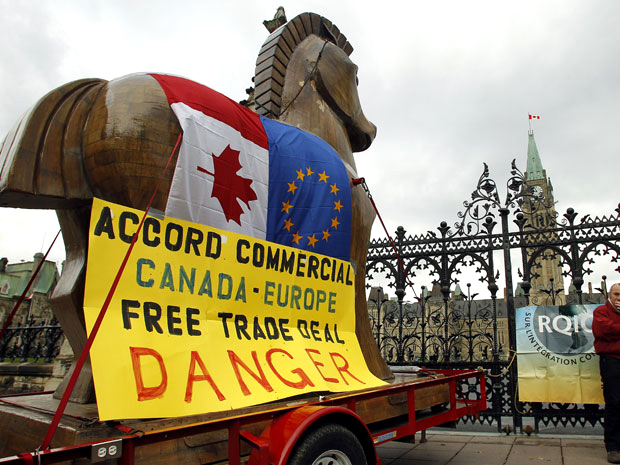Canada to clinch trade deal with EU in September
All the versions of this article: [English] [français]

CBC | 31 July 2014
Exclusive: Canada to clinch trade deal with EU in September
Elusive deal has been locked in 10 months of marathon bargaining
By Chris Hall, CBC News
National Affairs Editor
Canada and the European Union will release final details of their mammoth trade deal on Sept. 25 in Ottawa, ending a marathon 10 months of bargaining since Prime Minister Stephen Harper flew off to Brussels to sign the initial agreement in principle.
Multiple sources tell CBC News that the text of the full agreement will be made public by Harper and EU President José Manuel Barroso as part of a formal summit between the two sides.
The Comprehensive Economic Trade Agreement, or CETA, has been a priority for the Harper government, but talks dragged out over a series of issues ranging from the protection of intellectual property to the process for settling disputes between private companies and governments.
Just last week, news reports out of Europe suggested the Germany would refuse to sign the deal — a report later denied by Angela Merkel’s government — over the so-called investor-state dispute mechanism, which is meant to set up an independent tribunal for companies to resolve trade disputes, rather than have them go through a country’s courts.
The deal would give Canada favoured access to Europe’s 500 million people and $17 trillion economy.
But there have been growing concerns in Canada with how long it was taking to resolve the final issues.
One industry observer compared to the discussions to the game of whack-a-mole: as soon as one issue was resolved another would pop up.
Former Quebec premier Jean Charest told CBC Radio’s The House that the longer the talks dragged out, the more likely that Canada’s interests would be overtaken by the EU’s trade negotiations with the United States.
"On these kinds of issues there has to be a sense of urgency,’’ said Charest, who played a key role in promoting formal discussions between Canada and the EU while he was in office.
"We’re not going to hold the attention of the Europeans eternally. They have a lot on their plate.
“Canada is not even two per cent of the world economy. We’re important. We’re good. We’re interesting, but we need to seize the moment. and that’s what these things are about.’’
‘Progress being made’
Government officials declined to discuss the timing of the announcement, but noted ‘’excellent progress is being made’’ to complete the legal text of the agreement that is projected to boost the Canadian economy by $12 billion a year, and create almost 80,000 jobs.
But sources tell CBC News that the signing ceremony will be on Parliament Hill and include other EU leaders attending the summit as well as Canadian premiers.
It will follow also follow a trade mission to England in the first week of September, led by Harper and Trade Minister Ed Fast. They’ve invited Canadian business leaders along to promote economic ties and the pending removal of trade barriers on the vast majority of goods and services moving between Canada and Europe.
Sources say that Canadian officials have been pushing hard to finalize the deal, in part because Barroso’s term as president comes to an end in October. His departure, as well as the turnover of others in the executive, could have meant further delays and uncertainty if nothing was signed by that point.
As it is, CETA will still have to be approved by the European Parliament and the 28 countries in the EU.
Still, sources say it will be a significant legacy for Barroso, as European leaders turn to the much larger trade deal being negotiated with the U.S.
For Canadian officials, those EU-U.S. talks represented both a distraction and a challenge, and there were worries about the impact those negotiations could have on Canadian interests.
"All of a sudden, a negotiation we were driving on our own steam, based on our interests, are part of a broader play between Europe and the United States," said Charest, who now works with the law firm McCarthy-Tetrault.
"That’s not where we want to be.’’
Significant barriers
Certainly the negotiations between Canada and the EU took longer than anyone thought. Quotas for pork and beef, patent protection for pharmaceuticals, and coordinating financial regulations proved to be significant barriers to resolve.
But for Canada, the potential benefits are enormous. It would give this country a second major tariff-free trading partner, while lessening Canada’s dependence on the U.S. market.
“The benefits of this agreement are clear for Canada and the European Union,’’ one department official wrote in an email. The EU’s annual imports alone are worth more than Canada’s GDP.
For Harper, successful completion of the negotiations has been an elusive, yet over-arching objective.
He flew off to Brussels the day after his government tabled its Throne Speech last October to sign the interim deal, calling it a historic win for Canada, and boasting on his Twitter feed that it would lead to “thousands of new jobs for Canadians, and a half-billion new customers for Canadian businesses.”
Since then, the talks have dragged on, and he`s had to shrug off repeated opposition demands to see both the text of the deal, and what Canada was giving up.
Those questions now look to be answered next month.
Chris Hall is the CBC’s National Affairs Editor, based in the Parliamentary Bureau in Ottawa. He began his reporting career with the Ottawa Citizen, before moving to CBC Radio in 1992, where he worked as a national radio reporter in Toronto, Halifax and St. John’s. He returned to Ottawa and the Hill in 1998.





